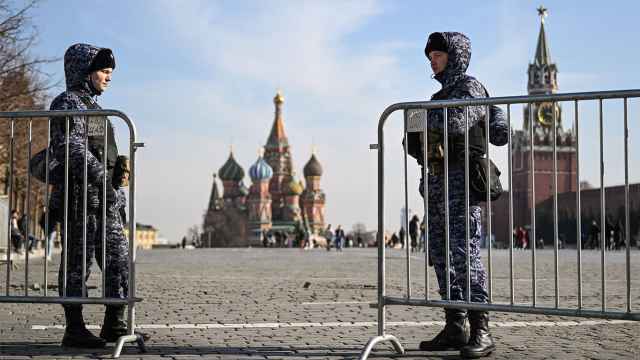MINSK — Newspapers linked to Belarussian President Alexander Lukashenko's administration have accused Poland and Germany of trying to overthrow the authoritarian leader.
Both countries denied the claim, and Germany's human rights commissioner said Saturday that Belarus must repeat its presidential election if it is to avoid political sanctions from the European Union over last month's contentious vote that saw Lukashenko stay in power.
The newspaper reports come less than a month after Dec. 19 protests over an allegedly fraudulent election were harshly dispersed by police, who beat and detained hundreds of demonstrators, including seven men who ran against Lukashenko.
Sovietskaya Belorussia, the official organ of Lukashenko's administration, published Friday what it said were extracts of intercepted conversations and seized documents that purportedly prove that the demonstrators were supported by Polish and German special services.
The authenticity of the excerpts could not immediately be confirmed, and there appeared to be no direct evidence in the excerpts showing the involvement of foreign security services.
Nonetheless, "there can be no doubts that the hands of first of all the Polish and German special services were on the events of Dec. 19," the newspaper said. "The training ground for organizing the formation of forces capable of changing the legal power in Belarus was Poland," it said. "Special training camps were constructed there for 'activists,' the future ruling class was prepared there."
More of the same claims were printed in Saturday's print media, with diplomats also being singled out from Britain, Bulgaria, the Czech Republic, Hungary, Latvia and Sweden.
Polish Foreign Ministry spokesman Marcin Bosacki called the claims "dramatic propaganda attempts touching on the absurd," according to a report by the Polish news agency PAP.
German Foreign Ministry spokesman Andreas Peschke said, "Those allegations are completely absurd and totally unfounded."
Germany's human rights commissioner, Markus Loening, said Saturday that a new election must be held and all political prisoners, including opposition candidates, be released if sanctions are to be averted.
"This regime is isolating Belarus from friends and neighbors," Loening said at a news conference in Minsk.
The Dec. 19 vote, in which Lukashenko was credited with nearly 80 percent support, was widely regarded as fraudulent and criticized by international observers. Mass protests were violently dispersed by police, who arrested seven of nine opposition candidates among more than 700 demonstrators.
Four of the arrested candidates remain in jail in Belarus and supporters say some were seriously injured.
Concern is especially high for Vladimir Neklyayev, who was severely beaten and later spirited away from a hospital by plainclothes police. On Friday, police raided his apartment looking for documents, his wife, Olga, told The Associated Press.
Authorities meanwhile are threatening to take custody of the 3-year-old son of candidate Andrei Sannikov, who also was beaten and jailed along with his wife.
Poland and Germany were the most visible countries in the West's push for Lukashenko to ease his longtime repression of opponents. The countries' foreign ministers had promised Belarus 3 billion euros ($4 billion) in aid from the European Union if the presidential elections were judged to be free and fair.
Lukashenko, embroiled in disputes with traditional backer Russia over rising prices for oil and gas imports, had appeared possibly receptive to the offer. But shortly before the election, Russia made concessions on oil exports equivalent in value to the EU-promised aid.
The Russian Energy Ministry said Friday that it has failed to clinch an oil price agreement with Belarus, which stopped receiving oil deliveries on Jan. 1, and talks would resume this week, Reuters reported.
On Thursday, Transneft chief Nikolai Tokarev expressed hope that a deal would be reached by the weekend and shipments could resume by Tuesday.
A Message from The Moscow Times:
Dear readers,
We are facing unprecedented challenges. Russia's Prosecutor General's Office has designated The Moscow Times as an "undesirable" organization, criminalizing our work and putting our staff at risk of prosecution. This follows our earlier unjust labeling as a "foreign agent."
These actions are direct attempts to silence independent journalism in Russia. The authorities claim our work "discredits the decisions of the Russian leadership." We see things differently: we strive to provide accurate, unbiased reporting on Russia.
We, the journalists of The Moscow Times, refuse to be silenced. But to continue our work, we need your help.
Your support, no matter how small, makes a world of difference. If you can, please support us monthly starting from just $2. It's quick to set up, and every contribution makes a significant impact.
By supporting The Moscow Times, you're defending open, independent journalism in the face of repression. Thank you for standing with us.
Remind me later.





